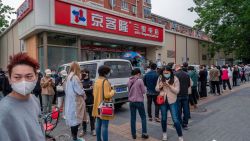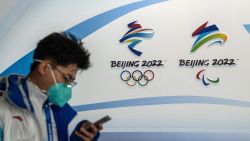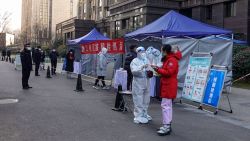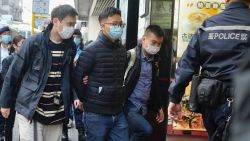More than 40% of expats surveyed by the American Chamber of Commerce in Hong Kong say they’re considering moving away from the former British colony as China’s influence grows and the city continues to enforce stringent quarantine rules.
In a report released on Wednesday, the largest international chamber in Hong Kong found that 42% of respondents are considering or planning on moving out of the city. Fifty-eight percent, however, said they had no plans to leave.
The chief concern of those thinking about packing up is discomfort over a controversial national security law enacted by China last year, with 62% of those respondents citing it as a reason to potentially depart.
The law bans sedition, secession and subversion against Beijing, and allows Chinese state security to operate in the territory.For some, the changes have led to “a generally declining mood across the community and increase in anti-foreigner sentiment,” according to the chamber.
In addition to the contentious new law, Hong Kong’s measures to battle the coronavirus pandemic have becomea factor, with 49% of those surveyed saying that strict quarantine rules had made it more difficult for them to travel and visit their families.
Currently, many people arriving in the city must spend up to 21 days in hotel quarantine at their own expense. Those found to be infected are immediately ordered to undergo government-run quarantines, along with anyone who has come in contact with them.The government has been criticized for sending babies and young children to government facilities in recent months, though it has also received praise for largely managing the rate of local infections.
AmCham’s survey was conducted this month with a small pool of its more than 1,300 members — about 325 participants.
The group characterized its findings as an informal “temperature” check of the city’s tight-knit expatriate community, particularly after higher tensions in recent years.
“People ask me every day whether expats are leaving Hong Kong following the stress of the 2019 violent protests, the passing of the national security law, recent electoral reform and strict Covid-19 quarantine measures,” Tara Joseph, president of AmCham Hong Kong, said in a statement.
“In this latest flash survey our membership anonymously answered questions and gave comments showing the anxieties they feel, both personally and professionally after a tough few years. While people share their love for living in this dynamic city, they also reveal growing underlying tensions and nagging fears.”
Hong Kong has long been seen as a vital business hub connecting East and West. Even after the city’s handover from Britain to China in 1997, it retained its image for decades, helped by a pledge from Beijing to maintain its semi-autonomous status.
But more recently, its standing as a global business hub has been called into question, with “an unprecedented number of expatriates leaving or planning to leave the city over the past few years,” according to AmCham.
Almost 42% of those surveyed by the group this month who said they were thinking of leaving also expressed pessimism about the city’s future competitiveness.
And earlier this year, Hong Kong was booted off an index of economic freedom that it used to lead, dealing another blow to its international reputation.
The Heritage Foundation, a conservative Washington think tank responsible for the rankings, said that it had started counting the city as part of China, following a change in methodology that meant the index would only rank “independent countries where governments exercise sovereign control of economic policies.”
Hong Kong officials blasted the move at the time, saying that excluding the territory was “neither warranted nor justified.” A government spokesperson also noted that Hong Kong is a member of the World Trade Organization, and enters into trade, taxation and investment agreements as an individual economy.
And last month, Luo Huining, director of the China Liaison Office in Hong Kong, asserted that the city’s business environment had been stabilized.
Luo made the remarks at an opening ceremony for Hong Kong’s first national security education day, where he also said that the new law was enacted after calls from Chinese President Xi Jinping that security was closely tied to prosperity.
“The international business community in Hong Kong has recently been caught at a crossroads,” AmCham said in its report Wednesday.
“Rising concerns about issues such as US-China tensions and high living costs [are] at odds with the many benefits of Hong Kong’s key business offerings.”
For many, though, the city still holds promise in other ways. Almost 77% of those who said they wanted to stay in Hong Kong cited a high quality of life as a factor, while 55% said they considered the business environment to be “excellent.” Nearly 48% added that the city’s proximity to mainland China market was a draw.
— Jadyn Sham and Eric Cheung contributed to this report.


























